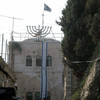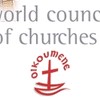
The World Council of Churches is deeply concerned about actions by the Government of Israel which threaten the achievement of a just peace for both Israel and Palestine by pre-empting negotiations on the final status of Jerusalem within the framework of international law. In an open letter, WCC wrote that while world attention is drawn to its Gaza withdrawal plans, the Government of Israel has intensified unilateral programs to consolidate control over Jerusalem and other occupied territory. The Council is concerned about threats and more threats, including an absentee property law allowing confiscation of Palestinian property in Jerusalem and a new regulation to require permits for Jerusalem residents entering other parts of the occupied West Bank. Read more about World Council of Churches concerned about Israeli actions in Jerusalem

After concluding a meeting in Geneva, the Executive Committee of the World Council of Churches (WCC) issued a statement demanding that Israel stop and reverse the construction of the wall in the occupied Palestinian territories, including in and around East Jerusalem. The WCC welcomed the hearing of the International Court of Justice to provide its advisory opinion on the legal consequences of the wall and draws attention of the world of the immense human costs paid by the Palestinian people and its long-term consequences on peace and reconciliation. Read more about World Council of Churches demands that Israel stops construction of wall
Despite their longstanding efforts to bring peace between Israelis and Palestinians, two experts clashed sharply over the role of international law in the peace process at an 11 November public forum entitled, “Peace and international law in Israel and Palestine: assessing the paths to peace.” The forum was part of the World Council of Churches’ (WCC) International Affairs and Advocacy Week in New York. Law professor Richard Falk asserted the importance of International Humanitarian Law, while former Knesset Member Avraam Burg downplayed the role of such legal documents in settling a conflict he portrayed as more rooted in clashing ideas of governance and history. Both panelists, however, decried religious intolerance and the use of violence against civilians. Read more about Panelists at odds over role of international law in Palestinian-Israeli peace efforts

On September 2, the World Council of Churches called for ‘the immediate withdrawal of the Israeli occupying forces from Palestinian territories’ and an end to its illegal occupation of Palestinian territories. Read more about World Council of Churches calls for end to illegal occupation



